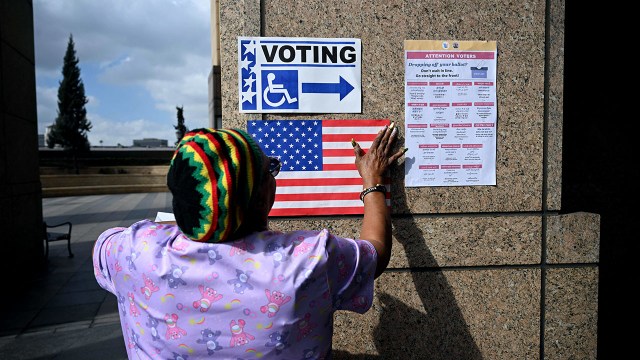
Around seven-in-ten U.S. adults (69%) say it’s very important to vote in elections to be a good member of society – more than say the same about any of the other activities included in a Pew Research Center survey conducted earlier this year.
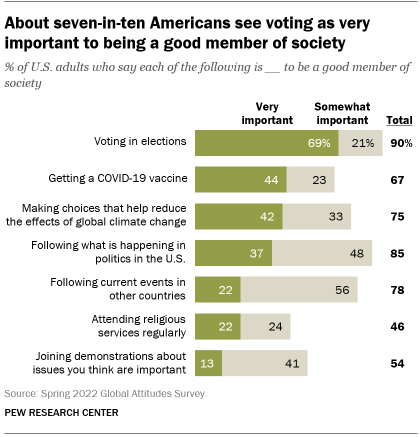
By comparison, fewer than half of Americans say it’s very important to get a COVID-19 vaccine (44%), to make choices that help reduce the effects of global climate change (42%), or to follow what’s happening in politics in their own country (37%) to be a good member of society. Fewer – around two-in-ten – say it’s very important to follow current events in other countries (22%) or attend religious services frequently (22%). And only 13% say it’s very important to join demonstrations about issues they think are important to be a good member of society.
This Pew Research Center analysis focuses on U.S. public opinion about what it means to be a good member of society. It is based on a survey of 3,581 U.S. adults conducted from March 21 to 27, 2022. Everyone who took part is a member of the Center’s American Trends Panel (ATP), an online survey panel that is recruited through national, random sampling of residential addresses. This way nearly all adults have a chance of selection. The survey is weighted to be representative of the U.S. adult population by gender, race, ethnicity, partisan affiliation, education and other categories. Read more about the ATP’s methodology. Here is the question used in this analysis, along with responses.
The comparison of responses by 2020 voter turnout relies on a measure of validated turnout among citizens who are currently at least 20 years old. Validated voters are citizens who told us that they voted in the 2020 general election and have a record for voting in that election in a commercial voter file. In an effort to accurately locate official voting records, up to three commercial voter files were searched for each panelist. The number of commercial files consulted varies by when a panelist was recruited to the ATP. Three files were used for panelists recruited in 2020 or before, while two were used for panelists recruited in 2021. Here are additional details about the voter validation process.
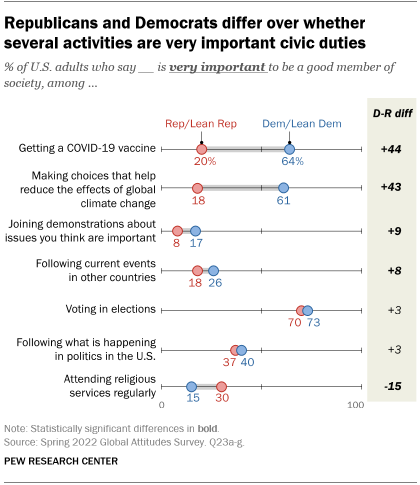
Although Republicans and Democrats differ in some views of election rules and procedures, there are no partisan differences in the perceived importance of voting. Around seven-in-ten Democrats and independents who lean toward the Democratic Party (73%) and a similar share of Republicans and GOP leaners (70%) say voting is very important to being a good member of society. Past Pew Research Center surveys have found a similar pattern.
Republicans and Democrats also don’t differ when it comes to the importance of following what is happening in U.S. politics. Around four-in-ten in each party (37% of Republicans and 40% of Democrats) say it’s very important to follow politics to be a good member of society.
When it comes to the importance of following current events in other countries, Democrats are somewhat more likely than Republicans (26% vs. 18%) to say it’s very important. Democrats are also more likely than Republicans to say joining demonstrations is very important (17% vs. 8%), while Republicans are more likely than Democrats to say attending religious services regularly is very important (30% vs. 15%).
Partisan divides are widest when it comes to the perceived importance of getting a COVID-19 vaccine and making choices to reduce the effects of climate change. In both cases, Democrats are more than 40 percentage points more likely than Republicans to see it as very important to being a good member of society. As Pew Research Center has previously found, the partisan gap in the perceived importance of getting a COVID-19 vaccine is the largest in the United States out of 19 countries surveyed this year. Climate change is also a key dividing line, with Democrats far more likely than Republicans to see it as a major threat.
Older and younger Americans diverge over what they see as very important for being a good member of society. Generally speaking, older people are more likely than younger people to find nearly all of the activities asked about to be very important. When it comes to voting, for example, 86% of those ages 65 and older say it’s very important, compared with around half (47%) of those under 30. On only two activities – making choices that help reduce the effects of climate change and joining demonstrations about issues people think are important – are older and younger people about equally likely to say it’s crucial for being a good member of society.
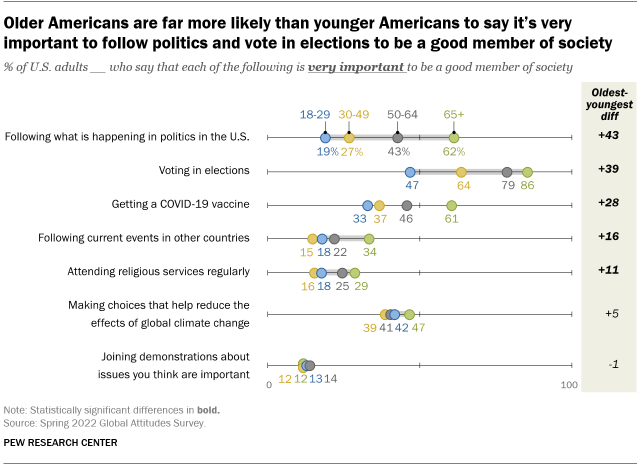
Americans with at least a college degree or more education are more likely than those without a college degree to see voting and getting a COVID-19 vaccine as very important. The opposite is true when it comes to attending religious services regularly, and there are no educational differences when it comes to the perceived importance of the other activities asked about in the survey.
2020 voter turnout was highest among those who see voting as very important
Do Americans who see voting as very important to being a good member of society actually follow through and vote? A separate analysis of 2020 turnout data suggests that the answer is yes.
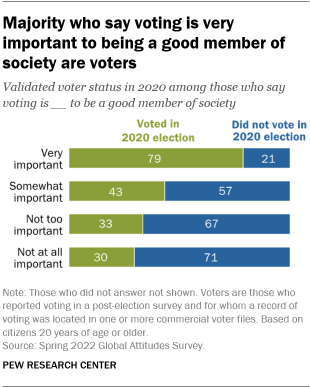
Among those who say it’s very important to vote in order to be a good member of society, the vast majority (79%) cast a ballot in the 2020 election. Among those who say it’s somewhat important to vote to be a good member of society, far fewer (43%) cast a ballot in 2020. And around three-in-ten of those who see voting as either not too important (33%) or not important at all (30%) opted to vote in 2020.
Of course, there are many reasons why some Americans may not have cast a ballot in 2020, even if they generally see voting as an important civic duty.



